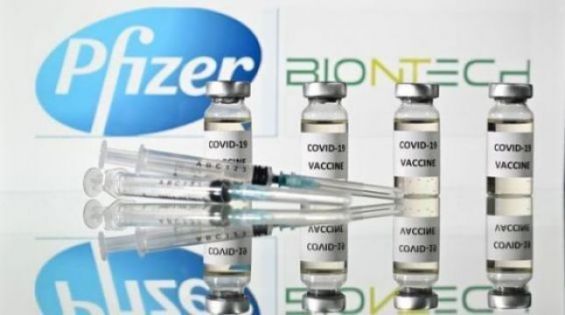As it plans to release, Thursday, the external review of Pfizer’s experimental vaccine, co-produced by Germany’s BioNTech, the US Food and Drug Administration (FDA) released on Tuesday a backgrounder on the clinical trials of the anti-Covid-19 vaccine.
The document comes as the Pfizer-BioNTech submitted an Emergency Use Authorization (EUA) request to the FDA, on November 20, for an investigational Covid-19 vaccine (BNT162b2). This experimental vaccine, based on the SARS-CoV-2 spike glycoprotein (S) antigen encoded by RNA and formulated in lipid nanoparticles (LNPs), proposed use on individuals 16 years of age and older with a dosing regimen of 2 doses, 30 µg each, administered 21 days apart.
Efficacy and immune reactions
Explaining how the new vaccine works, experts detailed that a reaction is witnessed 10 days following the first injection and the effect remains «very significant» after the second injection.
The second good news is that Pfizer & BioNTech's vaccine works on asymptomatic patients with comorbidities, regardless of age. As for the induced immune response, it remains «humoral and cellular», which is «good news», Dr Eric Billy, geneticist, wrote on Twitter.
Les données que l'on réclame sur les #vaccins #vcovid19 sortent donc.
Concernant #Pfizer , les data sont ici https://t.co/EHRnhR98Dt
Beaucoup de patients randomisés ...
.../...
--> https://t.co/nw5Lyjqp19 pic.twitter.com/zBVS5xMwzr— Le Doc (@Le___Doc) December 8, 2020
He indicates that although the sample remains «quite small», the vaccine would trigger a reaction 4 to 10 times greater. «This cellular response is directed only against the N-Terminal (proximal) part of the S protein of the virus, covered by the S1 stimulating peptide pool. The CD8 + cellular response was detected in ~ 85% of people vaccinated, a similar figure for CD4 +», he explained.
As for the humoral response, «we obtain levels of neutralizing antibodies equivalent or superior to those detected in Covid + patients», noting that «the neutralization is complete».
Vaccination and side effects
The FDA document, analyzed by experts, also shows some side effects of the vaccine. They cite «few deaths», the number of which remains lower than that in the placebo group. These are deaths that remain «expected and predictable».
Mode info COVID: Pfizer/BioNTech
— Eric Billy ???? (@EricBillyFR) December 8, 2020
Premiers commentaires, la réponse immunitaire induite est humorale ET cellulaire. Bonne nouvelle.
a partir de la page 22 du document ci-dessoushttps://t.co/FCZUlQW8KJ pic.twitter.com/BJOaTfH63D
Thus, cardiologist and vascular diseases specialist Florian Zores notes that, locally, «the injection spot gets red, hot and painful», which he considers «normal», because it is an inflammation reflecting «the reaction of the immune system which will make it possible to assimilate the vaccine».
He also mentions «flu symptoms post injection», which are not «serious». «The side effects in the vaccine group are primarily related to the injection itself. So no worries again, it's explainable and normal, it stays for 2 to 3 days and it goes», he reassured. As for «lymphadenopathy (increase in the size of the nodes) at the level of the arm and the neck, which lasted about ten days in some patients, the nodes remain the refuge of white blood cells», which is «also normal».
Fake news and open questions
Florian Zores also reacted to some fake news about the appearance of appendicitis in vaccinated people. «There is a little more (8 vs 4) of appendicitis in the vaccinated group. Out of 40,000 patients. This difference is probably purely due to chance», he stressed, insisting on the need of «monitoring in the coming months», although «there is no worrying signal». «This does not completely cancel the risk: there is still a very small risk of catching Covid after vaccination», he warned.
The cardiologist also brings up some questions that remain unanswered. He believes that «patients at risk are under-represented», while «the oldest are very few», as are the patients with serious forms of Covid-19 infection. «We do not know if the vaccine reduces the risk of developing a serious form in a patient who would have Covid despite the vaccine», he added.
The practitioner also raises the issue of contagiousness. «Does the vaccine reduce contagiousness? Maybe yes, maybe not. We don't know, it hasn't been studied. It is therefore necessary to consider (as long as there is no study) that a vaccinated subject can be contagious if they inhales the virus», he explained, insisting on wearing a mask.





 chargement...
chargement...













